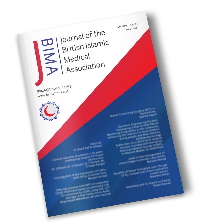
Wiley E1Qureshi H2 Yaqoob Z3 , Abdul-Razakq H4 Javaid F5 Malik A6 Latif A7
1Microbiology Registrar and HIS Graham Ayliffe Fellow 2017, University College Hospital London, 2GP ST3, Portland Medical Practice, Lincoln, 3Medical student, University of Nottingham, 4Trainee clinical scientist, Poole Hospital, Poole, 5Ophthalmology SHO, 6Tutor in Sociology, University of Nottingham; Director of Research, Bridge Institute, London. 7Senior Research Fellow, School of Health Sciences, University of Nottingham.
Abstract of poster which was presented at the BIMA National Conference , Birmingham 7th December 2019
Practising Muslim women who wish to observe faith dress codes face unique challenges whilst working within the healthcare sector. NHS dress code policies such as ‘Bare Below the Elbow’ policy (BBE) may run contrary to normative Islamic dress code (intended to cover the whole body besides the hands and face). Despite national Department of Health Uniforms and Workwear policy offering alternative options, local implementation has been suggested to act as a barrier to career progression. This study explores the views of Muslim women on dress codes while working in the NHS.
Methods: A quantitative, self-completion cross-sectional survey was distributed at the ‘Muslim Women Excelling in Islam and Medicine’ conference organised by the British Islamic Medical Association (BIMA) in Spring 2016.
Results: Out of 84 responses (median age 27 years, range 18-56) it was found that 83% usually covered their forearms for religious reasons and that three quarters reported that it was ‘important to them’ due to religious beliefs. Many (84%) reported being BBE whilst in hospital or working on wards. However, few (7%) reported their Trust had suggested an alternative in light of their religious beliefs (such as using disposable sleeves). It was found that less than half (44%) felt their faith requirements were acknowledged by the Trust with a notable 16% indicating their experience of the BBE policy had influenced their career choices.
Conclusions: This study demonstrates the dress code challenges that female Muslims face when working in the NHS. Greater clarity around equality and diversity considerations is required regarding BBE policy. This is one illustration of a wider issue of how policies can be at odds with personal beliefs that may contribute to reducing workforce diversity.

